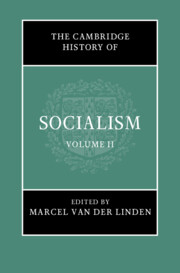Book contents
- The Cambridge History of Socialism
- The Cambridge History of Socialism
- The Cambridge History of Socialism
- Copyright page
- Contents
- Figures
- Maps
- Tables
- Contributors to Volume II
- Abbreviations
- Introduction to Volume II
- Part I Transforming State Power
- Social Democratic Routes in Europe
- Social Democratic Routes in Australia, the Americas, and Asia
- Worldwide Connections
- 12 The Second International: 1889–1914
- 13 The Second International Reconstituted: The Labour and Socialist International, 1923–1940
- 14 The Rise and Fall of the Asian Socialist Conference: 1952–1956
- 15 The Socialist International, 1951–, and the Progressive Alliance, 2013–
- 16 Municipal Socialism
- Southern Trajectories
- Left Socialisms
- Part II Transversal Perspectives
- Index
- References
13 - The Second International Reconstituted: The Labour and Socialist International, 1923–1940
from Worldwide Connections
Published online by Cambridge University Press: 03 November 2022
- The Cambridge History of Socialism
- The Cambridge History of Socialism
- The Cambridge History of Socialism
- Copyright page
- Contents
- Figures
- Maps
- Tables
- Contributors to Volume II
- Abbreviations
- Introduction to Volume II
- Part I Transforming State Power
- Social Democratic Routes in Europe
- Social Democratic Routes in Australia, the Americas, and Asia
- Worldwide Connections
- 12 The Second International: 1889–1914
- 13 The Second International Reconstituted: The Labour and Socialist International, 1923–1940
- 14 The Rise and Fall of the Asian Socialist Conference: 1952–1956
- 15 The Socialist International, 1951–, and the Progressive Alliance, 2013–
- 16 Municipal Socialism
- Southern Trajectories
- Left Socialisms
- Part II Transversal Perspectives
- Index
- References
Summary
When the Second International gathered for an Extraordinary Congress in Basel on 24–25 November 1912, right in the middle of the Balkan wars, the congress became a massive anti-war rally where the leading social democratic parties1 once again underlined their commitment to struggling for peace under all circumstances. But, as is well known, in the early days of August 1914 they behaved differently and declared support for their respective fatherlands and therefore the war.
- Type
- Chapter
- Information
- The Cambridge History of Socialism , pp. 300 - 320Publisher: Cambridge University PressPrint publication year: 2022
References
Further Reading
- 1
- Cited by

